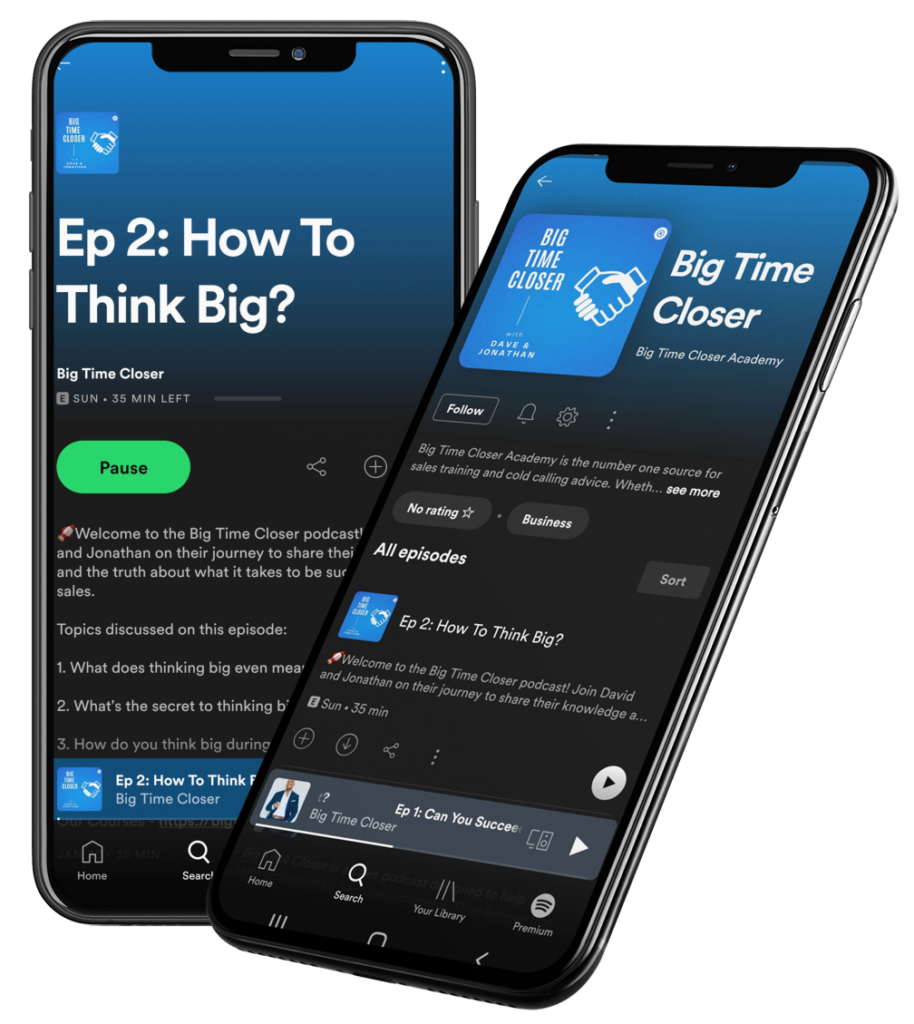As someone who previously worked in the Financial Services industry, I know how important it is to have a great cold calling script.
When it comes to managing finances, people are often very skeptical. In order to overcome this skepticism, you need to be able to connect with them on a personal level and show that you genuinely care about helping them achieve their financial goals.
When you don’t know where to begin, a great script will help you do just that.
Table of Contents
Do Financial Advisors Cold Call?
When most people think of financial advisors, most people think of networking at country clubs and schmoozing at business lunches. That definitely happens, don’t get me wrong. However, many financial advisors still utilize cold calling as part of their marketing strategy.
As a matter of fact, when I was a financial services rep, I placed more than 500,000 cold calls throughout my 15-year career, and generated millions of dollars in new business for my firm – pretty much all from the results of my cold calling. I was cold calling until the day I quit.
While cold calling may not be the most glamorous part of the job, it can be extremely effective when done correctly. So yes, although it’s not required at certain firms, most Financial Advisors do cold call.
How Should a Financial Advisor Prepare for A Call?
When preparing for a call, the most important thing to do is research your potential client. You should know everything you can about their investment portfolio, their risk tolerance, and their financial goals.
In some cases, you won’t know anything about your prospect beforehand. Hence, the “cold” in cold calling. If that’s the case, continue reading.
Secondly, you should always be familiar with the current market conditions and have a few talking points prepared that you can use to engage the client in a conversation. In the financial services industry, having industry knowledge is an absolute must – product knowledge alone won’t cut it. And like I said above, if you don’t know anything about their current portfolio, risk tolerance, etc., you’ll be able to ask some general questions that will help you get a better understanding of their financial situation.
Here’s an example of why you need industry knowledge while cold calling in the Financial Industry:
If you’re selling mutual funds to a customer and they start asking you about rising interest rates and the potential impact on their portfolio, you need to be able to answer those questions confidently. If not, you’ll quickly lose credibility – and the sale. When you’re cold calling, you have a fraction of the time to respond and be quick on your feet, so you need to be prepared.
Lastly, it’s important to have a script prepared that covers the key points you want to hit during the call. This way, even if the conversation veers off course, you can always bring it back to your main points.

What’s the Best Cold Calling Script for Financial Advisors?
So this script I’m about to give you is the exact script I used to generate thousands of new accounts, qualify tens of thousands of qualified leads, and build a multi-million dollar business.
This script isn’t based on theory, but rather, on experience. It’s been battle-tested and proven to work time and time again.
I’m going to break down each part of the script, and then tie it all together at the end.
Here’s the script:
Introduction
“Hi, is this (Prospect name)?
Hey! My name is ________ and I’m a financial advisor with XYZ firm.
How’s it going today?”
Debrief:
The introduction is critical. You need to sound confident, yet friendly. Remember, you’re trying to build yourself up as an expert here, not make a fast sale.
Your voice needs to be clear and concise, and your goal is simply to get the person on the phone to say yes – that they are in fact (Prospect name)
The last part of the introduction, “How’s it going today?” is key. I know there’s a lot of chatter about asking “how are you” and not asking it. But here’s why I think it’s effective: It shows that you’re friendly, and also allows you to listen for cues.
If they respond with something like “Not good. I just lost my job,” then you know you need to be more compassionate in your approach. However, if they say something like “It’s going great. I just got a promotion,” then you know you can be a little more aggressive/excited in your tone.
Reason Your Calling
“Reason for my call today, I just wanted to send you some information on my company, our track record, and get back to you next week with a few ideas in the stock market.
(Prospect name), is it best to reach you in the mornings or evenings?”
Debrief:
The reason for your call should be short, sweet, and to the point. You’re not trying to sell them anything here, you’re simply trying to set up a meeting.
Some suggest leading with a product, and that can work. But I like to keep it more generic because I want to be able to tailor my pitch to their specific needs. You won’t know what they actually need until the end of the call, once you’ve qualified them.
The last part of this section, “Is it best to reach you in the mornings or evenings?” is also very important. You want to be respectful of their time, and this shows that you’re not going to try to monopolize their day.
Additionally, it helps you structure your day better, going forward. If they say they’re only available in the evenings, you know they probably have a full-time job during the day and wouldn’t be able to meet during normal business hours.
This is important to know because if you can only meet with them in the evening, you need to be prepared to do more work on your own time, outside of normal business hours.
Qualifying Your Lead
“Okay Great! And just a few quick questions so I don’t waste your time:
- Are you currently working with other advisors?
- What kind of return are you seeing these days?
- Are you happy with the service you’re receiving?”
- Etc.”
Debrief:
The qualifying questions are by far the most important part of your script. You should have a list of all your important questions written down on the back of your hand until you memorize them.
Having great qualifying & probing questions will set apart a multi-million dollar business from a struggling one.
This is where you’ll find out everything you need to know about your prospect and determine whether or not they’re a good lead.
The key here is to be respectful, yet direct. You want to get the information you need without being too pushy. You don’t want to sound like your interrogating them, but you also want to be clear that you’re not going to waste their time.
Wrapping Up
“Okay, fantastic. What I’ll do today is shoot you an email and forward you everything we discussed. I’ll get back to you next week with some more information, and we’ll go from there.
What’s the best email address to send my info. to?”
Debrief:
The wrap-up is your last chance to make a good impression. You want to be sure to thank them for their time, reiterate what you’re going to do next, and grab their contact info if you don’t have it already.
I like to ask for their email address, since it’s the easiest way to get any important compliancy documents to them.
And that’s it! You’re done. If you’ve made it this far, congratulations! You did it!
The most important thing to remember is to be yourself, and be confident. The script is just a guide, meant to give you a general framework.
The Script
“Hi, is this (Prospect name)?
Hey! My name is ________ and I’m a financial advisor with XYZ firm.
How’s it going today?”
The reason for my call today, I just wanted to send you some information on my company, our track record, and get back to you next week with a few ideas in the stock market.
(Prospect name), is it best to reach you in the mornings or evenings?
Okay Great! And just a few quick questions so I don’t waste your time:
- Are you currently working with other advisors?
- What kind of return are you seeing these days?
- Are you happy with the service you’re receiving?”
- Etc.
Okay, fantastic. What I’ll do today is shoot you an email and forward you everything we discussed. I’ll get back to you next week with some more information, and we’ll go from there.
What’s the best email address to send my info. to?”
Cold Calling Tips For Financial Advisors
This script will take you very far – that’s my promise to you. But aside from the script, there are a few key things to remember that will take your cold calling to the next level as a financial advisor.
- Don’t be a robot: Your script is just a guide, meant to give you a general framework. Be sure to inject your own personality into the call, so you don’t sound like C-3PO trying to make a sales pitch.
- Memorize your script: And then speak from memory. This will help you sound more natural, and less like you’re reading from a script.
- Be confident: This is by far the most important tip I can give you – and the one that just comes with time and experience. If you’re not confident, the person on the other end of the line will be able to tell, and they’re not going to want to work with you.
- Be prepared: Have all your materials ready before you make your call. This includes your script, your list of questions, and any other resources you might need.
- Learn to listen: One of the most important skills you can have as a financial advisor is the ability to listen to your clients. This will help you understand their needs, and ultimately, sell them on your services.
- Consistency is key: Remember how I said I made 500,000 cold calls? I didn’t do it all in one month – it took me 15 years. The key is to be consistent. Set a goal for yourself, and make sure you stick to it. You got hung up on? Great! Continue dialing. You just got a great lead? Even better! Continue dialing, and learn to stay motivated.
- Enthusiasm & Excitement: If you’re passionate about what you do, the person on the other end of the line will be able to sense it, and they’ll be more likely to listen to what you have to say. Moreover, if you’re excited about the product or service you’re selling, it’ll be that much easier to sell it. So find something that gets you fired up – whether it’s the impact you’re making on people’s lives, or the commissions you’re earning – and use that to drive your enthusiasm.






